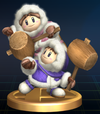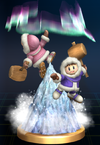Ice Climbers (SSBB)
| Ice Climbers in Super Smash Bros. Brawl | |
|---|---|
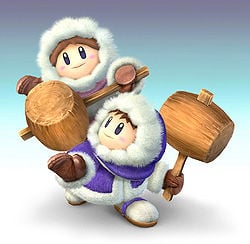 
| |
| Universe | Ice Climber |
| Other playable appearances | in Melee in Ultimate |
| Availability | Starter |
| Final Smash | Iceberg |
| Tier | S (2) |
The Ice Climbers (アイス クライマー, Ice Climber) return as playable characters in Super Smash Bros. Brawl. They were confirmed on the Smash Bros. DOJO!! website on September 14, 2007.
Sanae Kobayashi reprises her role as the Ice Climbers in Brawl, with most of their voice clips being recycled from Super Smash Bros. Melee, along with new clips recorded for Brawl.
The Ice Climbers rank 2nd on the current tier list, putting them in the S tier, a slight improvement over their already high 8th out of 26 ranking in Melee, making this their best placement in the series. This is primarily due to their extensive and intricate grab game that can potentially lead to an inescapable zero-to-death combo on any character on any stage. The partner mechanism of the character also forces opponents to rethink their approach, as one climber can easily disrupt combos and chain grabs. The duo also has two decent projectiles, and they are armed with a relatively powerful meteor smash along with one of the largest disjointed up aerials in the game. However, if the partner climber is KO'd, the leader cannot use special moves correctly and is somewhat helpless during recovery; a lone Ice Climber also has drastically lowered damage output and KO potential, especially due to their inability to perform a meteor smash, and is considerably more open to chain grabs and combos. Regardless, the Ice Climbers have very strong matchups (losing to only four characters, with Meta Knight being the only top tier they lose to), and very strong tournament results.
Attributes
The Ice Climbers are lightweight characters that have the unique property of being a "two in one" character, wherein the game considers each Climber to be a unique character in its own right. The follower is always slightly weaker than the leader, but only the follower can meteor smash with their forward aerial. The Ice Climbers are able to grab two different items and are even able to grab two separate characters. In addition, their unique property also makes them much harder to grab and throw effectively (when one Ice Climber gets grabbed, the partner can simply counterattack, making them immune to chain-grabs), and conversely allows them to have a superior grab game entirely unique to them (see "chain-grabbing and desynching" below). However, they can easily be separated by strong enough attacks. In this scenario, it is advisable to stick to and protect the partner, even if it puts the player in additional danger. Should the CPU Climber get KO'd during the stock, the remaining Climber will have drastically reduced damage output, KO ability, and recovery, with Belay becoming practically useless and Squall Hammer loses a good deal of distance (whereas with both Climbers they are excellent recovery moves).
The Ice Climbers are great at dealing damage when together, have decent attack speed, and possess a few interesting attacks in their arsenal. Their neutral special move, Ice Shot, is a projectile fired by each Ice Climber which slides along the ground, making it impossible to avoid by crouching/crawling. Blizzard, the down special move, can freeze opponents and even cover both sides if the partner is present, or alternatively can be made to cover one side if performed while jumping with the partner, giving the attack more power. Squall Hammer is a decent approach attack with good damage and speed, spinning the Ice Climbers around each other in a forward-moving hammer attack. Belay, the up special, is a powerful KO move should the second Climber connect with the opponent, but it is generally a risky use of the move given that it separates the Climbers and puts them into a helpless animation. A unique addition to their character is that the Ice Climbers are not affected by the conditions of slippery surfaces such as ice, and they won't slide on it. This is due to the fact that they are wearing cleats. Oddly, their cleats do not affect their traction on normal surfaces, as it is second-lowest in the game (Luigi has the lowest).
The Ice Climbers are not very good at using their standard arsenal of attacks for continuous hits, normally speaking. With weak throws, small hammers, and slow movement in general (slow falling, air, and dash speed), the Ice Climbers can usually only manage one or two good hits in close before they need to resort to Ice Shots or Blizzard again. With both Climbers present, KOing generally is not too much of a problem, although their smashes are generally better at racking up the damage than at KOing.
Chaingrabbing and desynching
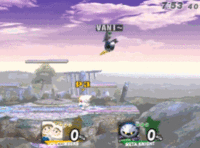
Many players consider the Ice Climbers to be "the King and Queen of all chain grabs" due to the fact that their two-in-one property allows for a variety of infinite chain-grab options that can combo into kill moves. For example, the lead Ice Climber can grab onto one opponent and use the forward throw. In the middle of the throw animation, the player can gain control of the CPU Climber, commanding them into performing a forward aerial spike, or grabbing again with the CPU Climber. while once again bringing the original, player-controlled Climber in for a new grab. Infinite chain grabs of this nature can be performed at any percent, on any character, on nearly any stage. One hindrance to this strategy is the Ice Climbers' short grab range and low traction, making it almost impossible to grab an opponent when they hit the player's shield(s) unless the Climbers powershield the attack.
The Ice Climbers have many different options to perform an infinite chaingrab. They can use any combination of forward throw, down throw, and back throw, but each option has different timings for every character. For example, against Meta Knight it is most common for players to infinite using a combination of down throw and back throw, as these two throws have the largest time windows to achieve a regrab. Against large characters that are difficult to chaingrab, like Snake and R.O.B., the down throw can be used in conjunction with the footstool hop and ice shots for another infinite: the hobble. A hobble is performed when the Ice Climbers' down throw sends opponents into the air, the second Ice Climber jumps and footstools the opponent back onto the ground, and as the opponent bounces, the first Ice Climber traps them with an ice shot causing a reset for another grab. The only possible break to a perfectly executed infinite is Brawl's random tripping, which can occur if either climber dashes for any length of time. This can be avoided by only performing infinite chaingrabs while walking. When a chain grab has raised an opponent's damage enough, the most typically used move to KO the opponent is their up smash, if a forward air meteor smash is inapplicable. All of these chain throws can be considered 0-KO combos.
For further two-in-one tricks, it is even possible to de-synchronize or "desync" the CPU partner by confusing it with erratic movement (such as dash-dancing), putting the player in control of both Climbers for as long as they are capable of maintaining it. Once the partner is desynced, the player can have it perform any move while the main Climber is in the middle of one, providing for all sorts of possible attack strategies that can be exceedingly difficult for opponents to escape from (alternating Blizzard, alternating Ice Shot). While desynced, the partner Climber has restrained movement within an invisible box around the main Climber; should they be separated or removed from this box, the CPU will take over again. This invisible box makes it so that if the player desyncs from the AI so that it charges a smash attack and they start walking or running away, the AI will slide in the player's direction while charging the smash. A unique thing that the player can do when desynced is that if they desync the AI to charge a smash attack, their Belay will cancel the AI's charging sequence and teleport it into the belaying sequence. Such techniques are extremely difficult to perform in combat, even for advanced players, due to the constant string of precise commands required for the Climbers to move/attack as intended. Nevertheless, these techniques are considered the backbone of playing the Ice Climbers at a competitive level.
Changes from Super Smash Bros. Melee
The Ice Climbers have received a mix of buffs and nerfs. Due to the changes in grab mechanics, they can no longer wobble, which previously played a part in their competitive viability. Additionally, the loss of wavedashing has also served to be problematic due to their already poor traction inhibiting their approach and mobility, though not as much as Luigi. Their damage output is also lower, some of their moves have reduced KO power and all of their grounded moves have more ending lag.
However, due to the influence of chaingrabs, the Ice Climbers are considered to be overall buffed due to the improvements to their chaingrabbing ability in which makes them even more deadly than in Melee. The player now has full control over the second climber during a grab allowing the player to freely chain grab and combo out of a grab. In addition, their standing grab is slightly faster and the changes to shields makes it easier for the Ice Climbers to grab their opponents. The Ice Climbers are one of the only characters in the game who can consistently 0-death the entire cast which is especially helpful as combos are generally significantly less deadly and plentiful in Brawl than in Melee due to the introduction of hitstun canceling. The partner climber is also more intelligent than they are in Melee making them more useful and less vulnerable. While the Ice Climbers' grounded movement was reduced, the rest of the cast received the same treatment and some of the moves which gave the Ice Climbers the most trouble (such as Fox's Shine and Peach's down smash) have been significantly nerfed making it harder for opponents to play around their grabs and separate them. Lastly, Blizzard is a much stronger tool than in Melee and can be a strong tool to allow the Ice Climbers to grab their opponents.
As a result, they are one of the few characters considered to have been truly buffed from Melee to Brawl, and they are widely considered to be the best character behind Meta Knight.
Aesthetics
 As with all characters, the Ice Climbers have received a drastic boost in quality, with their parkas having higher quality textures.
As with all characters, the Ice Climbers have received a drastic boost in quality, with their parkas having higher quality textures. The Ice Climbers have two new alternate costumes and Nana's orange costume is replaced with a blue one to make her look almost identical to Popo. One new costume has them in white while the other has Nana in black and Popo in grey. The player takes control of Popo in the blue skin and Nana in the new white and black skins.
The Ice Climbers have two new alternate costumes and Nana's orange costume is replaced with a blue one to make her look almost identical to Popo. One new costume has them in white while the other has Nana in black and Popo in grey. The player takes control of Popo in the blue skin and Nana in the new white and black skins. The red Nana blue Popo costume has darker colors, and Nana's yellow costume uses a much darker variant of yellow.
The red Nana blue Popo costume has darker colors, and Nana's yellow costume uses a much darker variant of yellow. Nana no longer switches positions on the character selection screen in costumes where she is the leader
Nana no longer switches positions on the character selection screen in costumes where she is the leader As on-screen appearances were not present in Melee, the Ice Climbers now receive one.
As on-screen appearances were not present in Melee, the Ice Climbers now receive one.
Attributes
 The Ice Climbers walk slightly faster (0.95 → 0.96).
The Ice Climbers walk slightly faster (0.95 → 0.96). The Ice Climbers dash slightly slower (1.4 → 1.388).
The Ice Climbers dash slightly slower (1.4 → 1.388). The Ice Climbers' air speed is faster (0.7 → 0.7708) though it is still very low.
The Ice Climbers' air speed is faster (0.7 → 0.7708) though it is still very low. As with other returning veterans, the Ice Climbers' falling speed was reduced (1.6 → 1.2). Compared to the returning veterans, however, the Ice Climbers fall faster. While this improves their endurance, it worsens their recovery and makes them more vulnerable to combos and chain grabs relative to the cast.
As with other returning veterans, the Ice Climbers' falling speed was reduced (1.6 → 1.2). Compared to the returning veterans, however, the Ice Climbers fall faster. While this improves their endurance, it worsens their recovery and makes them more vulnerable to combos and chain grabs relative to the cast. The Ice Climbers' gravity is lower (0.1 → 0.077). While this slightly hinders their vertical endurance, it also makes them less vulnerable to chain grabs.
The Ice Climbers' gravity is lower (0.1 → 0.077). While this slightly hinders their vertical endurance, it also makes them less vulnerable to chain grabs. The Ice Climbers' traction has been unchanged (0.035). Comparing with the returning veterans, however, the Climbers' traction is higher, making it easier for them to punish out of shield although it remains the second lowest traction in the game. Their traction remains unchanged on ice which is even more effective than in Melee as traction was decreased across the board in Brawl. They are also immune to tripping on ice while the rest of the cast has a higher chance of tripping on ice.
The Ice Climbers' traction has been unchanged (0.035). Comparing with the returning veterans, however, the Climbers' traction is higher, making it easier for them to punish out of shield although it remains the second lowest traction in the game. Their traction remains unchanged on ice which is even more effective than in Melee as traction was decreased across the board in Brawl. They are also immune to tripping on ice while the rest of the cast has a higher chance of tripping on ice. The Ice Climbers are heavier (88 → 92).
The Ice Climbers are heavier (88 → 92). Jumpsquat is longer (3 frames → 4).
Jumpsquat is longer (3 frames → 4). Both Ice Climbers can now grab a ledge at the same time, improving their recovery.
Both Ice Climbers can now grab a ledge at the same time, improving their recovery. The AI level of the partner when separated has been increased, now being nearly equivalent to a level 9 CPU.
The AI level of the partner when separated has been increased, now being nearly equivalent to a level 9 CPU. The partner climber can now mash out of a shield break.
The partner climber can now mash out of a shield break. Many of the partner's attacks now have lower hitlag multipliers, making their attacks harder to DI.
Many of the partner's attacks now have lower hitlag multipliers, making their attacks harder to DI. Stale move negation no longer affects the partner's attacks when they are performing the same attack as the leader.
Stale move negation no longer affects the partner's attacks when they are performing the same attack as the leader. To compensate for this, however, many of the partner's attacks now deal less damage (usually around 1%-3% less) resulting in a fair amount of their moves dealing less damage when they are together, although the partner's aerials and smash attacks have higher knockback than the leader's to somewhat compensate.
To compensate for this, however, many of the partner's attacks now deal less damage (usually around 1%-3% less) resulting in a fair amount of their moves dealing less damage when they are together, although the partner's aerials and smash attacks have higher knockback than the leader's to somewhat compensate. The Ice Climbers are easier to separate when attacked.
The Ice Climbers are easier to separate when attacked. The partner Ice Climber is now the same weight as the leader rather than heavier, and no longer has passive armor, making them easier to KO.
The partner Ice Climber is now the same weight as the leader rather than heavier, and no longer has passive armor, making them easier to KO. The removal of wavedashing has hindered the Ice Climbers' mobility and approach, especially compared to the other returning veterans, although it also hinders the rest of the cast's mobility, making it easier for the Ice Climbers to grab their opponents.
The removal of wavedashing has hindered the Ice Climbers' mobility and approach, especially compared to the other returning veterans, although it also hinders the rest of the cast's mobility, making it easier for the Ice Climbers to grab their opponents. The freeze glitch has been completely removed.
The freeze glitch has been completely removed.
Ground attacks
- Neutral attack:
 The first hit of neutral attack deals more damage (2% → 3%) and deals more damage overall due to changes to stale move negation (8% → 11% assuming both climbers are present).
The first hit of neutral attack deals more damage (2% → 3%) and deals more damage overall due to changes to stale move negation (8% → 11% assuming both climbers are present). Both hits of neutral attack have more ending lag (FAF 16 → 27 (hit 1), frame 18 → 20 (hit 2)).
Both hits of neutral attack have more ending lag (FAF 16 → 27 (hit 1), frame 18 → 20 (hit 2)).
- Forward tilt:
 Forward tilt deals more damage (8% → 9% (solo), 15% → 16% (non angled with partner) 18% (angled with partner)) although its base knockback was compensated on the up angled version (40 → 30). The non angled version also has higher base knockback (26 → 30) and the partner's version has less hitlag (1x → 0.5x).
Forward tilt deals more damage (8% → 9% (solo), 15% → 16% (non angled with partner) 18% (angled with partner)) although its base knockback was compensated on the up angled version (40 → 30). The non angled version also has higher base knockback (26 → 30) and the partner's version has less hitlag (1x → 0.5x). Forward tilt has more startup lag (frame 6 → 9) and ending lag (FAF 28 → 32).
Forward tilt has more startup lag (frame 6 → 9) and ending lag (FAF 28 → 32).
- Up tilt:
 Up tilt has bigger hitboxes and has a reduced hitlag multiplier (1x → 0.5x (leader loop hits/partner final hit), 0.3x (partner)), making it connect more reliably especially against grounded opponents.
Up tilt has bigger hitboxes and has a reduced hitlag multiplier (1x → 0.5x (leader loop hits/partner final hit), 0.3x (partner)), making it connect more reliably especially against grounded opponents. Up tilt's final hit deals less damage (7% → 4%) with no compensation on its knockback and up tilt has more ending lag (FAF 42 → 48).
Up tilt's final hit deals less damage (7% → 4%) with no compensation on its knockback and up tilt has more ending lag (FAF 42 → 48).
- Down tilt:
 Down tilt deals more damage (4-5% → 6%), has higher base knockback (30 → 40) and now sends opponents in a semi spike angle as opposed to a more vertical angle (70° → 20°). While this hinders its combo potential, it significantly improves its edgeguarding potential (which is overall more useful due to the introduction of hitstun canceling). It also connects much more reliably when both climbers are present.
Down tilt deals more damage (4-5% → 6%), has higher base knockback (30 → 40) and now sends opponents in a semi spike angle as opposed to a more vertical angle (70° → 20°). While this hinders its combo potential, it significantly improves its edgeguarding potential (which is overall more useful due to the introduction of hitstun canceling). It also connects much more reliably when both climbers are present. Down tilt has more ending lag (FAF 29 → 31).
Down tilt has more ending lag (FAF 29 → 31).
- Dash attack:
 Dash attack deals less damage (9% → 6%) although its knockback scaling was compensated (40 → 60). It also has more ending lag (FAF 38 → 41).
Dash attack deals less damage (9% → 6%) although its knockback scaling was compensated (40 → 60). It also has more ending lag (FAF 38 → 41).
- Forward smash:
 Forward smash has less startup lag (frame 13 → 12) and the sourspot deals more damage (10% → 12%). The partner's forward smash also has more knockback scaling (105 → 118).
Forward smash has less startup lag (frame 13 → 12) and the sourspot deals more damage (10% → 12%). The partner's forward smash also has more knockback scaling (105 → 118). Forward smash's sweetspot deals less damage (14% → 13%) and both hits have less base knockback (40 → 30). It also has slightly increased ending lag (FAF 47 → 48).
Forward smash's sweetspot deals less damage (14% → 13%) and both hits have less base knockback (40 → 30). It also has slightly increased ending lag (FAF 47 → 48).
- Up smash:
 Up smash has less startup lag with a longer duration (frames 14-18 → 13-18)
Up smash has less startup lag with a longer duration (frames 14-18 → 13-18) Up Smash has less knockback scaling (128 → 105 (leader), 113 (partner)) and it now has a sourspot which deals 9%. It also has more ending lag (FAF 44 → 50).
Up Smash has less knockback scaling (128 → 105 (leader), 113 (partner)) and it now has a sourspot which deals 9%. It also has more ending lag (FAF 44 → 50).
- Down smash:
 Down smash can deal more damage since it now has two hits (20%-22% → 36%-40% (both climbers)).
Down smash can deal more damage since it now has two hits (20%-22% → 36%-40% (both climbers)). Down smash now launches opponents vertically (361° → 60°/83°).
Down smash now launches opponents vertically (361° → 60°/83°). Down smash has more startup lag (frame 6 → 9) and ending lag (FAF 36 → 45). It also deals less knockback (50 (base), 110 (scaling) → 30/105 (leader), 30/113 (partner)) and it now has a sourspot which deals 10% although it launches opponents at a more vertical angle to compensate.
Down smash has more startup lag (frame 6 → 9) and ending lag (FAF 36 → 45). It also deals less knockback (50 (base), 110 (scaling) → 30/105 (leader), 30/113 (partner)) and it now has a sourspot which deals 10% although it launches opponents at a more vertical angle to compensate.
Aerial attacks
 Neutral, back and up aerials have less landing lag (20 frames → 15 (neutral/back), 32 frames → 30 (up)). Due to the removal of L-canceling however, their landing lag was not fully compensated.
Neutral, back and up aerials have less landing lag (20 frames → 15 (neutral/back), 32 frames → 30 (up)). Due to the removal of L-canceling however, their landing lag was not fully compensated. Due to their lower fall speed, the Ice Climbers can now use two aerials in a short hop by using either back aerial or up aerial.
Due to their lower fall speed, the Ice Climbers can now use two aerials in a short hop by using either back aerial or up aerial.- Neutral aerial:
 Neutral aerial can now auto-cancel in a short hop due to the Ice Climbers' lower falling speed. Despite the partner's neutral aerial dealing much less damage (8% → 5%), it's knockback scaling was compensated (100 → 128).
Neutral aerial can now auto-cancel in a short hop due to the Ice Climbers' lower falling speed. Despite the partner's neutral aerial dealing much less damage (8% → 5%), it's knockback scaling was compensated (100 → 128). Neutral aerial deals less damage (8% → 7%) hindering its KO potential with a solo climber.
Neutral aerial deals less damage (8% → 7%) hindering its KO potential with a solo climber.
- Forward aerial:
 Forward aerial deals more damage (11%/10%/9% → 12% (solo), 20% → 24% (clean with both climbers)) improving its KO potential despite the leader's forward aerial having lower knockback scaling (100 → 95) although the base knockback on the partner's sweetspot was compensated (40 → 20). It also sends opponents at a more horizontal angle (70° → 40°) improving its edgeguarding and KO potential.
Forward aerial deals more damage (11%/10%/9% → 12% (solo), 20% → 24% (clean with both climbers)) improving its KO potential despite the leader's forward aerial having lower knockback scaling (100 → 95) although the base knockback on the partner's sweetspot was compensated (40 → 20). It also sends opponents at a more horizontal angle (70° → 40°) improving its edgeguarding and KO potential. The leader's forward aerial can no longer meteor smash meaning that only the partner's forward aerial can meteor smash.
The leader's forward aerial can no longer meteor smash meaning that only the partner's forward aerial can meteor smash. Forward aerial has a shorter duration (frames 19-22 → 19-20).
Forward aerial has a shorter duration (frames 19-22 → 19-20).
- Back aerial:
 Back aerial deals more knockback (30 (base), 100 (scaling) → 25/107 (leader), 25/128 (partner)).
Back aerial deals more knockback (30 (base), 100 (scaling) → 25/107 (leader), 25/128 (partner)). Back aerial no longer has a sweetspot which deals more damage (12% → 11%) and knockback (30 (base), 110 (scaling) → 25/107).
Back aerial no longer has a sweetspot which deals more damage (12% → 11%) and knockback (30 (base), 110 (scaling) → 25/107).
- Up aerial:
 Clean up aerial deals more damage (8/9% → 10%) although its knockback was compensated (10 (base), 140 (scaling) → 20/120 (leader), 20/142 (partner)) and it still has a sourspot which deals 9%.
Clean up aerial deals more damage (8/9% → 10%) although its knockback was compensated (10 (base), 140 (scaling) → 20/120 (leader), 20/142 (partner)) and it still has a sourspot which deals 9%. The leader's up aerial sourspot deals less knockback although the knockback on the partner's version was compensated for its lower damage (10 (base), 140 (scaling) → 20/120 (leader), 20/142 (partner)).
The leader's up aerial sourspot deals less knockback although the knockback on the partner's version was compensated for its lower damage (10 (base), 140 (scaling) → 20/120 (leader), 20/142 (partner)).
- Down aerial:
 Down aerial no longer has set knockback (36 (set), 110 (scaling) → 40 (base), 90 (leader scaling), 130 (partner scaling)). This gives the attack KO potential around 170%.
Down aerial no longer has set knockback (36 (set), 110 (scaling) → 40 (base), 90 (leader scaling), 130 (partner scaling)). This gives the attack KO potential around 170%. Down aerial now acts as a stall-then-fall attack, making it risky to use offstage, but giving it recovery usage via down air stall.
Down aerial now acts as a stall-then-fall attack, making it risky to use offstage, but giving it recovery usage via down air stall. Down aerial deals less damage (9% → 8%) has more startup lag with a shorter duration (frames 3-52 → 9-51) and it has more landing lag (25 frames → 42).
Down aerial deals less damage (9% → 8%) has more startup lag with a shorter duration (frames 3-52 → 9-51) and it has more landing lag (25 frames → 42).
Throws/other attacks
- Grabs:
 Standing grab has less startup lag (frame 7 → 6).
Standing grab has less startup lag (frame 7 → 6). Dash grab has more startup lag (frame 7 → 8).
Dash grab has more startup lag (frame 7 → 8). The partner is now controlled by the player rather than the AI when grabbing a foe, enabling the player to effectively control the direction in which to throw the foe, significantly extending chaingrabs and allowing for easy kill setups. This means that despite the removal of Wobbling, the Ice Climbers can still effectively zero-death the entire cast which while more difficult to perform, it still remains inescapable and is overall more versatile.
The partner is now controlled by the player rather than the AI when grabbing a foe, enabling the player to effectively control the direction in which to throw the foe, significantly extending chaingrabs and allowing for easy kill setups. This means that despite the removal of Wobbling, the Ice Climbers can still effectively zero-death the entire cast which while more difficult to perform, it still remains inescapable and is overall more versatile.
- Pummel:
 Pummel deals less damage (3% → 1%) and its speed wasn't increased enough to compensate (frame 26 → 19).
Pummel deals less damage (3% → 1%) and its speed wasn't increased enough to compensate (frame 26 → 19).
 All throws except down throw deal less damage (11% → 8% (forward), 7% → 6% (back), 11% → 6% (up)).
All throws except down throw deal less damage (11% → 8% (forward), 7% → 6% (back), 11% → 6% (up)).- Back throw:
- Up throw:
 Up throw has higher base knockback (110 → 120).
Up throw has higher base knockback (110 → 120).
- Down throw:
 Down throw's knockback was tweaked with down throw dealing much less knockback (70 (base), 40 (scaling) → 30/100). When combined with the removal of DI against moves which don't put opponents into tumble, this makes the attack more reliable for chain-grabbing both with or without the partner.
Down throw's knockback was tweaked with down throw dealing much less knockback (70 (base), 40 (scaling) → 30/100). When combined with the removal of DI against moves which don't put opponents into tumble, this makes the attack more reliable for chain-grabbing both with or without the partner. Down throw no longer requires the aid of Blizzard or down aerial to string chaingrabs due to the greater degree of control the player has over the partner.
Down throw no longer requires the aid of Blizzard or down aerial to string chaingrabs due to the greater degree of control the player has over the partner.
Special moves
 The Ice Climbers have different voice clips when performing their specials, and all specials have different sound effects.
The Ice Climbers have different voice clips when performing their specials, and all specials have different sound effects.- Ice Shot:
 Ice Shot is no longer absorbable and can now be B-reversed.
Ice Shot is no longer absorbable and can now be B-reversed. Ice shot deals less damage (5% → 3%). The hammer also no longer has a hitbox, heavily reducing the move's maximum damage output (26% → 6%) and increasing the move's startup lag (frame 15 → 17).
Ice shot deals less damage (5% → 3%). The hammer also no longer has a hitbox, heavily reducing the move's maximum damage output (26% → 6%) and increasing the move's startup lag (frame 15 → 17). Landing with the move from the air now results in an animation where the Climbers crash land on their rears. The landing lag is the same, however.
Landing with the move from the air now results in an animation where the Climbers crash land on their rears. The landing lag is the same, however.
- Squall Hammer:
 Squall Hammer connects more reliably, making it easier to rack up damage with it.
Squall Hammer connects more reliably, making it easier to rack up damage with it. Squall Hammer now sends off flakes of ice if both Ice Climbers are present. The loop hitboxes also deal more consistent damage, though it is still very inconsistent (1-4% → 2-3%).
Squall Hammer now sends off flakes of ice if both Ice Climbers are present. The loop hitboxes also deal more consistent damage, though it is still very inconsistent (1-4% → 2-3%). Squall Hammer no longer grants any vertical distance unless both Ice Climbers are present.
Squall Hammer no longer grants any vertical distance unless both Ice Climbers are present.
- Belay:
 Belay now acts as a tether recovery when used close to a ledge; the partner will first shoot to the ledge, then the leader will immediately reach up to it. A lone Ice Climber's Belay also covers slightly more distance, allows them to move left or right, and allows the climber to turn around, no longer leaving the climber helpless if they are facing away from the ledge.
Belay now acts as a tether recovery when used close to a ledge; the partner will first shoot to the ledge, then the leader will immediately reach up to it. A lone Ice Climber's Belay also covers slightly more distance, allows them to move left or right, and allows the climber to turn around, no longer leaving the climber helpless if they are facing away from the ledge. The partner climber travels less horizontal distance when using Belay. It also has more landing lag (25 frames → 30).
The partner climber travels less horizontal distance when using Belay. It also has more landing lag (25 frames → 30).
- Blizzard:
 Blizzard deals consistent damage (1-2% → 2%) and it connects more reliably. It also freezes opponents significantly sooner and more reliably. It can now also be B-reversed.
Blizzard deals consistent damage (1-2% → 2%) and it connects more reliably. It also freezes opponents significantly sooner and more reliably. It can now also be B-reversed.
- Iceberg:
 The Ice Climbers now have a Final Smash: Iceberg. They summon an enormous iceberg up from the ground that covers almost the entire stage, damaging and freezing enemies who touch it.
The Ice Climbers now have a Final Smash: Iceberg. They summon an enormous iceberg up from the ground that covers almost the entire stage, damaging and freezing enemies who touch it.
Moveset
Note: This assumes that both Ice Climbers are present.
| Name | Damage | Description | ||
|---|---|---|---|---|
| Neutral attack | 3% (leader), 2% (partner) | A horizontal swipe followed by an upward swing. | ||
| 4% (leader), 2% (partner) | ||||
| Forward tilt | ↗ | 9% (both) | Does a side swing with their hammers. Can be angled up or down, with the partner dealing more damage if angled up or down. | |
| → | 9% (leader), 7% (partner) | |||
| ↘ | 9% (both) | |||
| Up tilt | 1% (hits 1-6), 4% (hit 7 [leader]), 3% (hit 7 [partner]) | Twirl their hammers over their heads, creating a lingering hitbox that deals multiple hits. Can often lead to a grab at low percents. | ||
| Down tilt | 6% (leader), 4-5% (partner) | Sweep their hammers across the ground in front of them. Used generally for gimping recoveries such as Snake's Cypher. | ||
| Dash attack | 6% (leader), 4% (partner) | Leaps forward and swings their hammers in front of themselves. | ||
| Forward smash | 13%/12% (leader), 10%/9% (partner) | Lifts their hammers over their heads, then smashes them straight down. Deals good knockback it both Ice Climbers' hammers connect. Deals less damage if the opponents hit the hilt of the hammers and more damage if they hit the head. | ||
| Up smash | 11%/9% (leader), 9%/8% (partner) | Swings their hammers in an arc over their heads. Good as a finisher from chain grabs. Deals more damage if the opponent hit the head of the hammer. | ||
| Down smash | 12%/10% (leader), 9%/8% (partner) | Spins around and sweeps the ground with their hammers. Can hit up to four times if the opponent is really close and at low percentages. The second most damaging down smash in the game if all four hits connect. Deals more damage if the opponent hits the head of the hammer. | ||
| Neutral aerial | 7% (leader), 5% (partner) | Spin in a circle with their hammers outstretched. Good for aerial spacing. | ||
| Forward aerial | 12% (leader), 12% (partner sweetspot), 7% (partner sourspot) | Holds their hammers up and bring them down in a similar fashion to their forward smash. The partner can meteor smash opponents if the move is sweetspotted. | ||
| Back aerial | 11% (leader), 8% (partner) | Turns around and does a backswing with their hammers. | ||
| Up aerial | 10%/9% (leader clean), 7% (leader late), 7%/6% (partner clean), 5% (partner late) | Thrust their hammers above themselves like their up tilt, but with only one hitbox per Ice Climber. | ||
| Down aerial | 8% (leader), 5% (partner) | Hold their hammers below themselves and falls downwards. A stall-then-fall move, with the stall being almost unnoticeable. Has very large landing lag if not auto-cancelled. | ||
| Grab | — | |||
| Pummel | 1% | A headbutt. The leader pummels the opponent, whereas the player has some control over the partner while pummeling. | ||
| Forward throw | 3% (hit 1), 5% (throw) | Hits opponent forward with their hammers. If the player walks slightly forward with the partner before using, they can regrab the opponent again right after they use the attack, making this throw a chaingrab. | ||
| Back throw | 6% | Throws opponent behind. Usable in a chaingrab. | ||
| Up throw | 2% (hit 1), 4% (throw) | Throw opponent upwards then hits them with hammer. | ||
| Down throw | 6% | Spins and then throws the opponent to the ground. Can be used to chain grab infinitely with good timing if both Ice Climbers participate. | ||
| Forward roll Back roll Spot dodge Air dodge |
— | — | ||
| Techs | — | — | ||
| Floor attack (front) Floor getups (front) |
6% | Gets up and spins around, hitting with their hammers. | ||
| Floor attack (back) Floor getups (back) |
6% | Gets up and swipes their hammers on both sides. | ||
| Floor attack (trip) Floor getups (trip) |
5% | Gets up and spins around, hitting with their hammers. | ||
| Edge attack (fast) Edge getups (fast) |
8% (hammer), 6% (body) | Quickly gets up and slams their hammer on the ground. | ||
| Edge attack (slow) Edge getups (slow) |
10% (hammer), 8% (body) | Slowly gets up and swipes their hammer forwards. | ||
| Neutral special | Ice Shot | 1-3% | Each Ice Climber fires a chunk of ice that slides along the ground and bounces off walls. When used in midair, the Ice Climbers will gain a slight boost in the air, but it will only work once before landing on the ground. | |
| Side special | Squall Hammer | 2-3% (loop) | Both Ice Climbers spin around together while moving along the ground, consisting of many hits. It can also be used as a recovery move by mashing the B button, which causes both Ice Climbers to rise in the air. It gains more distance when both Ice Climbers are present. | |
| Up special | Belay | 16% | The leading Ice Climber throws the following Ice Climber in the air with a rope. The following Ice Climber then pulls the leader upwards. If there is a nearby edge, the following Climber will target it, leading to a safe recovery for both Ice Climbers. Each Ice Climber become helpless after the move is used. | |
| Down special | Blizzard | 1-2% | Each Ice Climber blows icy wind from their hands, damaging nearby opponents. When the move is used on the ground, the partner will shoot in the direction opposite of the leader. | |
| Final Smash | Iceberg | 2% (hit), 5% (frozen) | The Ice Climbers summon a huge Iceberg into the middle of the field. Touching the iceberg results in freeze damage, and possibly becoming frozen. Being frozen when pushed off the edge can lead to a swift KO, as the frozen player falls with full speed. | |
Stats
| Stats | Weight | Dash speed | Walk speed | Traction | Air friction | Air speed | Air acceleration | Gravity | Falling speed | Jumpsquat | Jump height | Double jump height |
|---|---|---|---|---|---|---|---|---|---|---|---|---|
| Value | 92 | 1.4 – Initial dash 1.388 – Run |
0.96 | 0.035 | 0.015 | 0.7708 | 0.01 – Base 0.08 – Additional |
0.077 | 1.2 – Base 1.68 – Fast-fall |
4 | 34.69501461 - Base ? - Short hop |
? |
Announcer call
English
Wii Remote selection sound
- An Ice Shot sound is heard and both Ice Climbers say "Youp!"
On-screen appearance
- The Condor flies in with them hanging off its feet, then they jump off.
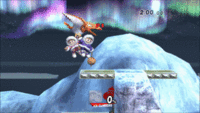
|
|---|
Taunts
- Up taunt: They set down their hammers and jump up and down. In the Ice Climber NES game, this is the victory celebration of the Ice Climbers during the results screen (albeit without the flag).
- Side taunt: They will point their hammers diagonally upward shout "Yup!", as wind blows behind them (same as in Melee, only with different sound effects).
- Down taunt: They dance in a circle.
| Up taunt | Side taunt | Down taunt |
|---|---|---|
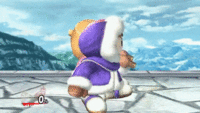
|
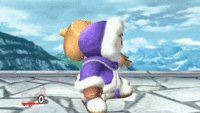
|
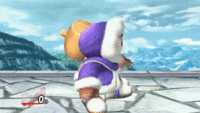
|
Idle poses
- Spin their hammers.
- Drops their hammers off their shoulders then picks them back up.
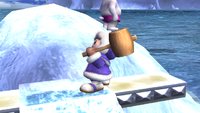 |
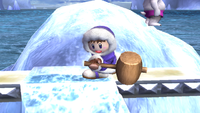
|
|---|
Crowd cheer
| English | Japanese | |
|---|---|---|
| Cheer | File:Ice Climbers Cheer NTSC Brawl.ogg | File:Ice Climbers Cheer JP Brawl.ogg |
| Description | Na-Na! Po-po | Ice-cli-mer! |
| Pitch | High female, then Deep male | Group chant |
- In the NTSC-U and PAL versions, when playing as Nana, the Back sound of the menu plays in lieu of the crowd chant.
- The fact that the crowd chant changes (albeit in a glitchy manner) depending on which Climber is leading the pair might indicate that the lead Climber's name was intended to be chanted first by the crowd.
Victory poses
- Up: Both nod and high five one another.
- Left: Both jump up and down (their victory pose from Ice Climber).
- Right: Nana hides behind Popo, only showing her face as Popo shifts from left to right.
| Up | Left | Right |
|---|---|---|
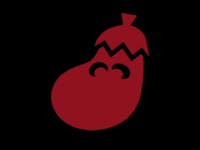
|

|

|
In competitive play
Notable players
- See also: Category:Ice Climbers players (SSBB)
9B - Widely considered the best Ice Climbers player in the world and one of the best players in Japan along with Edge, notably winning SKTAR 3.
DeLux - Placed 5th at WHOBO 5.
ESAM - Considered one of the best players in the United States during the game's later stages; although famous primarily for his Pikachu, has used an Ice Climbers co-main to great success, defeating players such as Kakera and ZeRo using them.
Kakera - Known as one of the top players in Japan, placed 5th at Apex 2012.
lain - A nationally dominant player during his peak from 2009-2010.
Miyacchi - Defeated players such as 9B, Smasher, Nagahari, Earth, OCEAN, Suinoko, Shu, Kei and Masashi.
Nakat - Quickly rose as a top Ice Climbers player in 2013, with a 4th place at SKTAR 2 and wins over Mew2King, Anti, Nairo, and ZeRo.
Vinnie - A nationally dominant player in the later stages of Brawl's life, after switching to Ice Climbers from Mr. Game & Watch.
Yunon - Defeated players such as Shu, Kuroobi, and RAIN.
Tier placement and history
In the first year of Brawl's metagame, the Ice Climbers were ranked as high tier characters but weren't considered a particularly dominant force, given how weak Popo alone is after Nana dies, and their powerful grab tactics were unrecognized at the time. However, Ice Climbers players soon began to utilize their infinite chain grabs, giving them an extremely powerful zero-to-death option against any other character, which shot them up the tier list. Players found dealing with this difficult, as it completely changed the way players fought the Ice Climbers, with the matchup now revolving around avoiding getting grabbed at all, and the Ice Climbers were able to completely shut down characters who lacked effective means to avoid grabs or separate the Climbers. lain became the character's first top level player in 2009 and 2010, achieving multiple major top 8 placements, such as Apex 2009 and S.N.E.S.. This resulted in the Ice Climbers being considered uncontested top tiers by the Brawl Back Room's the fourth tier list where they ranked 5th, just short of two years after Brawl's international release. However, the Ice Climbers were held back by their relative lack of top representation compared to other top tiers, and lain was never able to win a major over other top tier mains. Additionally, the existence of numerous extremely unfavorable stage counterpicks kept the Ice Climbers in check, preventing them from becoming truly dominant. In the earlier Brawl metagame, multiple stages with scrolling platforms and hazards, such as Rainbow Cruise, Brinstar, and Norfair, were available as counterpicks; these stages favored more air-based gameplay and made it much more difficult for the Ice Climbers to complete a zero-to-death chain grab without getting interrupted by the stage.
As Brawl's metagame further refined, the Ice Climbers' tournament presence continued to grow. The Ice Climbers' worst stages also happened to be Meta Knight's strongest stages; as Meta Knight's dominance over the Brawl scene continued to grow, Rainbow Cruise, Brinstar, and Norfair eventually were banned in all Meta Knight legal tournaments due to his unmatched aerial prowess on those stages. The other two stages with more minor moving platforms and hazards, Halberd and Delfino Plaza, also became more frequently banned due to Meta Knight's dominance there, and usually only one of these stages was available as a counterpick, which gave Ice Climbers mains the opportunity to play around this with a stage ban. These factors allowed the Ice Climbers to truly shine in the Brawl scene. Although lain became inactive, a new wave of even better Ice Climbers players arose from 2011 to 2014. 9B, Vinnie, ESAM, Kakera, and NAKAT quickly became some of the biggest tournament threats in both North America and Japan, achieving multiple first place victories at events such as SumabatoX 6, SKTAR 3, and the MK-banned WHOBO 4 and WHOBO 5; 9B in particular was considered by many to be the outright best player in all of Japan. As a result, the Ice Climbers became one of most dominant characters in tournaments behind Meta Knight, and this coincided with their rise to 2nd place on the eighth and final Brawl Back Room tier list in 2013, right underneath Meta Knight in their own tier above the rest of the characters. Some players argued that since the Ice Climbers have access to a zero-death on every character that works at any percent, they could be tied for first place with Meta Knight, or could even be first place themselves; however, despite these advancements, the Ice Climbers' results never approached Meta Knight's uncontested dominance before the end of Brawl' active competitive life at the release of Smash 4.
The Ice Climbers are among the most disliked characters in Brawl by both casual and competitive players, since they possess a reliable zero-death against any character, something no other character has access to, with many players supporting the ban of the infinite chain grabs in tournaments. Due to the prominent competitive philosophy at the time of Brawl however, zero-death chain grabs were uncommonly singled out for banning in tournament rulesets, and with the definition of what construes an "infinite chain grab" usually being rigid, players of the Ice Climbers could find loopholes to avoid using it while still nearly securing stocks with each grab, making opponents' predicaments effectively the same. Some tournaments in the post-Smash-4 era, such as Glitch 2, have banned the Ice Climbers altogether alongside Meta Knight, due to being considered too powerful, especially when Meta Knight is banned, farther fueled by their unpopularity among opponents and spectators alike.
Role in The Subspace Emissary
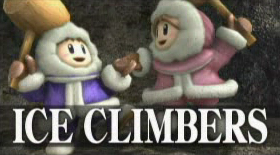
The Ice Climbers were first seen climbing up a mountain together, possibly in pursuit of the Halberd or they were just climbing. When Meta Knight passed them going up the mountain, the Ice Climbers took it as a challenge and jumped up the mountain with Meta Knight. Once they reached the top, the Ice Climbers celebrated with their "victory" for getting up the mountain first, until they and Meta Knight found Lucario, who was looking for a fight with Meta Knight, so the Ice Climbers watch from the side nervously. After the fight, the winner revives the loser, to their relief, and the Halberd crashes the Great Fox into the mountain. Although Meta Knight and Lucario managed to board the Halberd, the Ice Climbers (ironically) are thrown back to the ground towards Marth, Lucas, the Pokémon Trainer, and Ike. After facing some more Subspace Army troopers (with help from Mario and Link's group), the Ice Climbers teamed up with the other heroes as they journeyed into Subspace but are turned into trophies by Tabuu. Ice Climbers are then revived by King Dedede, Luigi, Ness, and Kirby and help the other smashers defeat Tabuu and restore the World of Trophies to normal.
Playable appearances
- The Glacial Peak
- Entrance to Subspace
- The Great Maze (if rescued in Subspace (Part II))
Exclusive stickers
These stickers can only be used by the Ice Climbers, or a select few including them:
- Balloon Fight Enemy: [Specials: Indirect] Attack +4
- Donbe: [Slash] Resistance +26
- Duck: Launch Resistance +20
- Fat Hockey Player: [Specials: Indirect] Attack +12
- F-Type: [Throwing] Attack +22
- Nana: [Specials: Direct] Attack +29
- Wild Gunman: [Specials: Indirect] Attack +5
- Yakuman Player: [Electric] Resistance +28
In Solo Modes
Classic Mode
In Classic Mode, Ice Climbers can appear as an opponent in Stage 9 on Summit. Ice Climbers can also appear as an opponent in Stage 11, but only if they haven't appeared in Stage 9.
All-Star Mode
In All-Star Mode, Ice Climbers are fought in Stage 4 on Summit.
Event Matches
Solo Events
- Event 11: Yoshi's Rainbow: As the Ice Climbers, the player must KO six Yoshis in the order of red, pink, yellow, green, cyan, and blue.
- Event 17: Super Waterfall Climb: Zelda must survive on Rumble Falls until the background changes into a waterfall. Two pairs of Ice Climbers will try to hinder the player's progress.
- Event 34: All-Star Battle Melee: Ice Climbers are one of the opponents fought in this event. All opponents are newcomers from Super Smash Bros. Melee.
Co-Op Events
- Co-Op Event 10: The R.O.B.'s of Tomorrow: Lucario and the Ice Climbers must defeat five R.O.B.s of varying sizes on Summit.
- Co-Op Event 21: The True All-Star Battle: Both players select a character and take on the entire roster on Battlefield.
Ending Images
Trophies
The Ice Climbers' main and Final Smash trophies can be obtained by clearing Classic Mode and All-Star mode respectively with the Ice Climbers.
- Ice Climbers
- The one in blue is Popo, and the one in pink is Nana. They use their incredible jumping powers and hammers to break blocks and climb to the summit. They grab veggies, and if they can catch the condor at the end, they conquer the mountain. Other than breaking blocks, their hammers are good for sending foes flying, climbing down from blocks, and destroying icicles.
: Ice Climber
- Iceberg
- The Ice Climbers' Final Smash. This giant ice mountain appears in the middle of a stage--it's incredibly slippery, so it's hard to control yourself when traversing it. In addition to being slick, this ice is also COLD, so opponents will take damage just from touching it. Attack the ice, and it will take damage and slowly shrink. Is it actually useful? That's a mystery.
: Super Smash Bros. Brawl
Alternate costumes
Nana becomes the leading, player-controlled character when using the 2nd, 4th, and 6th costumes shown below. The stock icons for these costumes change to reflect this, but the character select portraits always show Popo in front.

| |||||
Gallery
Using Blizzard on Link on Rumble Falls.
Popo footstooling Kirby on Lylat Cruise.
Taunting on Delfino Plaza.
Trivia
- Along with Pokémon Trainer, Diddy Kong, and Jigglypuff, the Ice Climbers are one of the only characters to have a unique "Defeated/No Contest" pose different from the traditional hand clapping, with their head down while rubbing their eyes, making it seem as if they are crying. This pose is a reference to the one they make in Ice Climber after failing in a bonus level.
- If one looks carefully, Nana can actually be seen smirking while crying while Popo is frowning. This is fixed in Ultimate.
- In Stamina mode, it is possible for the partner to die before the leader. Regardless of whether this happens or not, the partner will lay on the ground motionless, but not blink red.
- If the partner is caught in a trapping Final Smash and the leader is KO'd, the partner will disappear, leaving the opponent attacking nothing. Some examples are Ike's, Meta Knight's, Link's, and Toon Link's, and as seen here.
- Both Ice Climbers must win a microgame in the WarioWare, Inc. stage to be rewarded.
- Certain Final Smashes, especially trapping ones, can cause the trailing Ice Climber's special effects to be slowed down under the effect of a Timer (Nana's stays even after the Timer is done). The effects end when one or both of the Ice Climbers are KO'd.
- When CPU controlled, if one Ice Climber is Star KO'd, the partner will sometimes taunt.
- Brawl is the only game where the portraits of the Ice Climbers are not swapped around when Nana is in the lead, the only game where their default costume is not available in Team Battles and the only game where Nana takes the lead in all even numbered costumes.
- If the leader dies in Stamina Mode without losing all their stamina, the partner won't disappear and can keep playing normally. This was later fixed in Ultimate.
- If the leader loses their stamina after the partner has been KO'd but they didn't lose all their stamina in Stamina Mode, the partner will respawn in the middle of the stage but will still be defeated.
- The Ice Climbers, Ganondorf, Meta Knight, Mr. Game & Watch, and Samus are the only characters whose icon in the Subspace Emissary and the Sticker menu is not based on their renders.
External links
- Ice Climbers' page at Smash Bros. DOJO!!.
- Chain Grab Tutorial
- Ice Climber Character Guide on SmashBoards
- Ice Climbers' Chain Grabbing Every Character, 0% to death
- Ice Climbers' hitbox size of each of their moves, shown with Popo
| Fighters in Super Smash Bros. Brawl | |
|---|---|
| Veterans | Bowser · Captain Falcon · Donkey Kong · Falco · Fox · Ganondorf · Ice Climbers · Jigglypuff · Kirby · Link · Luigi · Mario · Marth · Mr. Game & Watch · Ness · Peach · Pikachu · Samus · Yoshi · Zelda / Sheik |
| Newcomers | Diddy Kong · Ike · King Dedede · Lucario · Lucas · Meta Knight · Olimar · Pit · Pokémon Trainer (Charizard · Ivysaur · Squirtle) · R.O.B. · Snake · Sonic · Toon Link · Wario · Wolf · (Zero Suit Samus) |
|
| |
|---|---|
| Fighter | Ice Climbers (SSBM · SSBB · SSBU) |
| Stages | Icicle Mountain · Summit |
| Items | Vegetables |
| Enemies | Polar Bear · Topi |
| Other | Condor |
| Trophies, Stickers and Spirits | Trophies (SSBM · SSBB) · Stickers · Spirits |
| Music | Brawl · Ultimate |
| Masterpiece | Ice Climber |





